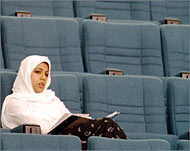Economy tops Kuwait’s concerns
Kuwaiti male-voters will be going to the polls on Sturday hoping ther new parliament will focus more on the country’s economy and battle rising unemployment.

This will the first parliamentary elections since the United States ousted Iraqi President Saddam Hussein.
But the US-led war on Iraq is having little, if any, influence on the campaign.
Instead, Kuwaitis list employment and the economy as their top priorities.
“I don’t want to see any more graduates waiting in long lines and I want to see the health issue dealt with seriously and a stable economy,” said 36-year-old Abdul Razzak al-Ajeel at an election rally.
Parliamentary hopeful Mishari al-Osaimi speaks of corruption in major ministries in a country he describes as “politically paralysed”.
“It’s that bad that a member of parliament is the first to encourage a minister to disobey the law. How do you expect a minister to be afraid of parliament? This is the beginning of the decline of the state as a whole,” he claims.
Economic woes
Sadeq Ahmad says he has been attending as many rallies as possible and believes parliament cannot exert enough power for change.
“Every time this parliament wanted to do something that government didn’t, it would block it,” he said.
“Our economy is down and we need to change certain economic ideas and decisions. I want to see Kuwait open up,” said Admad.
 |
|
Kuwaiti women, who are not |
Kuwait has already passed legislation allowing foreigners to own stocks listed on the emirate’s bourse, along with two other laws allowing direct and indirect foreign investment.
But a privatisation bill first proposed in 1992 is still held up in parliament.
While the private sector lies largely dormant, Kuwait’s public expenditure grows, with more than 93 percent of the 200,000-strong national workforce employed by government on high salaries and generous pensions.
Kuwaitis, offered incentives to work in the private sector, are exempted from taxes, while education, health care, housing, electricity and water are provided almost free.
At the rallies, Kuwaitis voice concerns about employment and housing problems.
Members of parliament took the government to task in Monday’s closing session, claiming up to 12,000 graduates are currently seeking employment.
Some Kuwaitis said the outgoing parliament fell short of expectations and was too fractious with too many political groupings.
Mohammad Jassim al-Hubail, 33, warned that oil would not support Kuwait’s economy in the future. He said the next parliament needs to issue a law protecting the workforce and a taxation law because, “this is a prelude to privatising the economy”.
Only 136,715 men out of the local population of 885,000 are registered to vote this weekend.